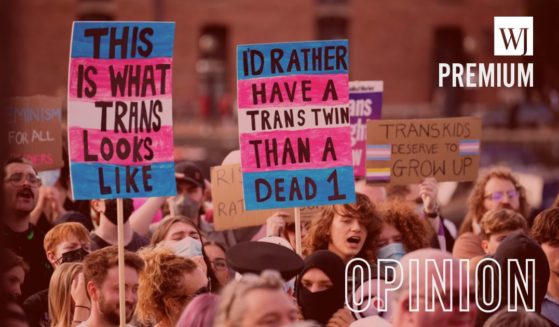Opinion: Americans Should Fear Government, Not Corporations
With the Federal Communication Commission’s recent rescission of the so-called Net Neutrality regulation, social media and political punditry was awash in anti-corporation diatribes. Yet, when assessed logically, it is not corporations that should be feared, but rather government, and the power they can wield against us.
There are many who seem to make a sport of bashing business and the free market system. They appropriately point out the egregious moral and legal failures of some firms but then ascribe culpability to all in the corporate world equally.
At the national level, it’s become a “pro sport,” as professional politicians exculpate or absolve themselves of all their regulatory blunders creating the business environment that companies must function in, and then cast blame on the corporate world when the unintended consequences of government statute and regulation are perniciously manifest.
This unwarranted and illogical fear of American corporations was well articulated by a recent blogger who said, “Not only is it appropriate to keep corporate transgressions ever present in any debate concerning the state of our economy, but that unless we do, capitalism as we once knew it will continue its metamorphosis into a controlling entity that has undermined the very Democracy that enabled it to exist.”
Yet what power does any corporation, or collection of corporations, possess that even comes close to that which is wielded by government?
Logically, there is much more to fear about government than there ever is to fear about the business world. Businesses make things, sell things and provide services, all to generate a profit so they can grow bigger, hire more people, sell more gadgets and acquire other companies.
True, the larger companies grow, the greater their potential impact on the economy and their influence with lawmakers. But they have no more power than what the politicians and government agencies grant.
In spite of potential influence in D.C., corporations cannot deprive us of our civil or constitutional rights. Corporate policy sometimes can affect their employees and in some cases, their customers. But corporations cannot take away our collective freedom of speech, freedom of religion or freedom of association, or deprive us of unlawful search and seizure. In short, they cannot deprive us of our constitutionally guaranteed freedoms.
Nor can they force us to give them 30 percent of our income. Their boards of directors cannot vote to force all of us to part with our earnings to pay for their pet projects and payback for political favors, or coerce us into complying with their ideological convictions.
However, government can do all of those things. And we have observed, especially during the previous administration, how government can be actively engaged in this assault on individual freedom and liberty. They can force us to pay more for our energy consumption. They can force us pay $12,000 per household for a health insurance plan. They can force any reference of God out of the public sphere, if it smacks of anything Christian.
They can do all these things — and at one time or another, they have attempted to.
As governments’ appetite for spending increases, so likewise their need to expropriate more of our income increases. With a vote in Washington, or a new rule enacted by a government bureaucracy, we can lose more of our earnings. We can lose more of our liberties. We can be coerced into doing things we have moral, legal, and constitutional objections to.
Corporations don’t have that power.
And, as in the case of the 2015 Obama-era net neutrality rule, by the stroke of a pen, a government agency can force corporations to do things that are not in the best interest of their customers. This bureaucratic creep in power grabbing was pervasive during the Obama years, when government agencies merely expanded their own power to control, force and penalize individuals and corporations based on ideologically motivated regulation.
This unbridled tendency to broaden governmental control over the masses is to be feared even more than acts of Congress, for Congress is accountable to the people, while the rule-making and regulations of government bureaucracies and agencies can, and often do, go unchecked and uninhibited.
With the factual realization that government has the power to eliminate or minimize our freedoms, and corporations do not, which should we fear more? I can choose not to buy from a company because I object to their policies. But I have no such luxury to withhold my taxes for objectionable cause. I can choose to live outside of a corporations’ influence, but as an American, I cannot simply choose to live outside the parameters of government policy, regulation, and laws.
There is no inherent virtue in government or in capitalism per se, but there is inherent virtue in liberty. Both government and corporations should abide by those same constitutional precepts that were designed to assure individual liberty, and rather than abridging those rights, affirm and perpetuate them.
Neither the absolutism of statism nor unbridled capitalism morally serve the greater interests of the nation. But freedom does.
There is ample reason to be wary of corporations, but not to fear them. After all, they have little power over our fundamental liberties and freedoms. But with a legislative vote and the stroke of a pen, government can — and has, in many instances — reshaped America from the land of the free to the land of the oppressed, and usurped power and authority “reserved to the people,” as the 10th Amendment promises.
As Thomas Jefferson wisely stated, “When government fears the people, there is liberty. When the people fear the government, there is tyranny.” And only government can strip us of our liberty, and impose tyranny.
The views expressed in this opinion article are those of their author and are not necessarily either shared or endorsed by the owners of this website. If you are interested in contributing an Op-Ed to The Western Journal, you can learn about our submission guidelines and process here.
Truth and Accuracy
We are committed to truth and accuracy in all of our journalism. Read our editorial standards.











